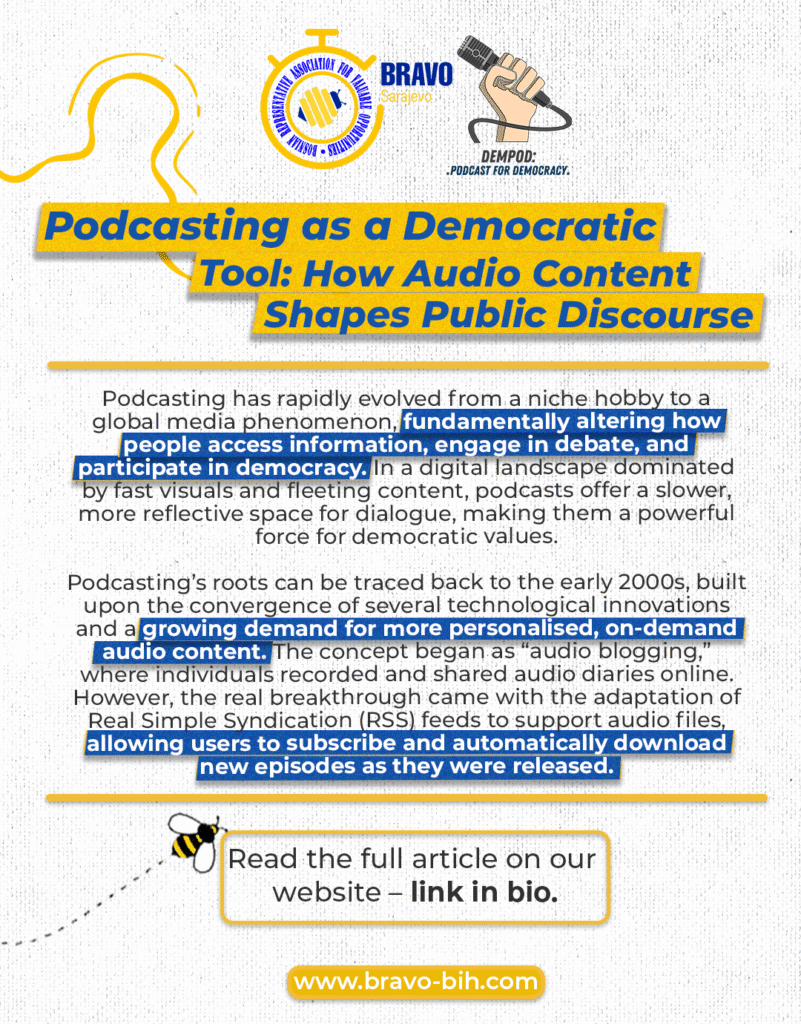
Podcasting has rapidly evolved from a niche hobby to a global media phenomenon, fundamentally altering how people access information, engage in debate, and participate in democracy. In a digital landscape dominated by fast visuals and fleeting content, podcasts offer a slower, more reflective space for dialogue, making them a powerful force for democratic values.
The term “podcasting” was coined in 2004 by journalist Ben Hammersley, who recognised the potential of this new medium as internet radio was booming. Apple’s integration of podcasts into iTunes in 2005 marked a turning point, propelling podcasting into the mainstream.
History of Podcasting and Its Rise as an Independent Media Channel
Podcasting’s roots can be traced back to the early 2000s, built upon the convergence of several technological innovations and a growing demand for more personalized, on-demand audio content. The concept began as “audio blogging,” where individuals recorded and shared audio diaries online.
However, the real breakthrough came with the adaptation of Real Simple Syndication (RSS) feeds to support audio files, allowing users to subscribe and automatically download new episodes as they were released. This innovation enabled a seamless distribution model for creators and listeners alike.
The term “podcasting” was coined in 2004 by journalist Ben Hammersley, who recognised the potential of this new medium as internet radio was booming. Apple’s integration of podcasts into iTunes in 2005 marked a turning point, propelling podcasting into the mainstream. Steve Jobs famously described it as the “next generation of radio,” and soon, podcasts like “This Week in Tech” and “The Ricky Gervais Show” were attracting hundreds of thousands of downloads per episode, with the latter even earning a spot in the Guinness Book of Records as the world’s most downloaded podcast.
Throughout the late 2000s and 2010s, the rise of smartphones and ubiquitous internet access further fueled podcast growth. Built-in podcast apps and streaming platforms made it easier than ever for users to discover, subscribe to, and listen to content on the go. This accessibility allowed podcasts to evolve from a niche hobby into a mainstream phenomenon, with genres ranging from news and education to comedy and literature.
Today, podcasting is recognised as a major force in global media, offering a diverse array of voices and perspectives, and continuing to shape how information and stories are shared.
Why Open-Access Media Matters in Democratic Societies
Open-access media is foundational to the health of democratic societies. At its core, democracy depends on informed citizens, freedom of expression, and the ability to participate in public debate. Open-access media, such as podcasts, embody these democratic values by providing platforms that are accessible to all, regardless of socioeconomic status or institutional affiliation.
A free, pluralistic media sector empowers people by giving them access to accurate, fair, and diverse information. This enables citizens to make informed decisions, participate in civic life, and hold those in power accountable. When information flows freely and represents many opinions, it fosters a more inclusive and participatory democracy.
Open-access media enhances transparency by making information available to everyone, not just a privileged few. This transparency is vital for exposing corruption, informing public debate, and building trust between citizens and institutions. For example, investigative podcasts and independent journalism have played pivotal roles in uncovering abuses of power and mobilising public action.
The Role of Citizen Voices in Shaping Narratives
Unlike traditional media, which can be constrained by ownership, regulation, or high production costs, open-access platforms like podcasting lower the barriers for entry. This democratizes content creation, ensuring that marginalised voices, such as minorities, youth, and migrants, can share their stories and perspectives. Open standards and accessible technologies further ensure that everyone, regardless of location or background, can participate in the digital public sphere.
Open-access media fosters a sense of community and shared purpose by enabling multi-dimensional conversations and collective learning. It supports the development of a collective consciousness, where diverse conversations feed into broader societal debates and decision-making.
Case Examples: Global and Regional Podcasters Tackling Social Issues
- In Chicago, youth-led podcasts like “Our Stories, Our World” have brought together diverse community members, including activists, educators, and public officials, to share personal stories and discuss critical issues such as public safety, education, and health. This grassroots approach fosters community dialogue and civic engagement.
- Internationally, podcasts have become vital tools for activists and independent journalists to report on social movements, human rights, and government accountability, often in regions where mainstream media is restricted or censored.
- Educational podcasts have also played a role in promoting media literacy, critical thinking, and fact-based decision-making, all of which are essential for a healthy democracy.
Conclusion: Podcasting’s Unique Power in Democratic Participation
Podcasting stands out as a uniquely democratic medium. Its accessibility, flexibility, and intimacy foster open dialogue and community building. By enabling anyone to create and share content, podcasts support freedom of expression, broaden access to information, and invite critical debate — cornerstones of any vibrant democracy. As the medium continues to evolve, its role in shaping public discourse and empowering citizens is only set to grow.
